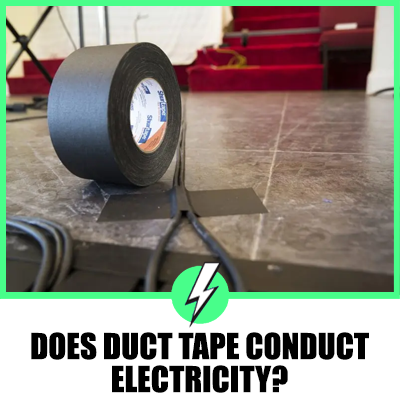Does Duct Tape Conduct Electricity? A Comprehensive Guide
In the world of quick fixes and DIY solutions, duct tape often emerges as the hero.
Whether it’s a leaky pipe or a torn piece of fabric, duct tape seems to provide a temporary solution for just about everything.
But what about electrical repairs?
Does duct tape conduct electricity?
This question has sparked many debates both online and offline. Let’s delve into the details.

Contents
What is Duct Tape?
Duct tape, known as ‘duck tape’ in the UK, is a type of adhesive tape typically coated with polyethylene and reinforced with a fabric mesh.
It’s lauded for its strength, versatility, and water-resistant properties.
The tape was originally developed during World War II to seal ammunition cases, preventing water from damaging the ammunition.
Today, it’s a staple in most toolboxes, known for its durability and strong adhesive properties.
Does Duct Tape Conduct Electricity?
The answer to this question isn’t as straightforward as it might seem.
Standard duct tape, made from polyethylene, fabric mesh, and adhesive, does not conduct electricity.
These materials are insulators, meaning they do not allow electricity to flow through them.
However, there is a variant of duct tape that is made from adhesive aluminium foil.
This type of duct tape can conduct electricity due to the metallic properties of aluminium.
Is Duct Tape Safe for Electrical Wires?
While duct tape can be used in a pinch to cover exposed electrical wires, it is not recommended for long-term use.
The adhesive in duct tape can melt when exposed to heat, which can occur if the wires are carrying a high current.
This can lead to the tape becoming loose and potentially exposing the wires.
Therefore, for safety reasons, it is better to use electrical tape, which is specifically designed to insulate electrical wires and can withstand higher temperatures.
Is Duct Tape Resistant to Electricity?
Duct tape made from polyethylene and fabric mesh is resistant to electricity up to a certain voltage.
It can hold up to 600 volts of electricity, making it a temporary solution for covering exposed wires in emergencies.
However, it is not a long-lasting solution and should not be used for high-voltage applications.
What Kind of Tape Conducts Electricity?
There are specific types of tapes designed to conduct electricity, known as conductive tapes.
These include copper foil tapes, tinned copper foil tapes, and aluminium foil tapes.
They are used for grounding and shielding in electrical applications.
Can Electricity Pass Through Tape?
Electricity can pass through tape if the tape is conductive.
As mentioned earlier, certain types of tapes like copper foil and aluminium foil tapes are designed to conduct electricity.
However, standard duct tape and electrical tape are insulators, so electricity cannot pass through them.
Insights from Online Discussions
Online discussions reveal a variety of experiences and opinions about the use of duct tape with electricity.
Some users have reported that duct tape can conduct electricity if it contains aluminium foil.
Others have shared experiences of using duct tape to insulate worn-out cables, with varying degrees of success.
One user on an online forum reported that they used duct tape to insulate a soldered connection on a phone line, only to discover that the tape did not insulate against the 24V carried by the phone line.
This anecdote serves as a cautionary tale about the limitations of duct tape as an electrical insulator.
Duct Tape vs Electrical Tape
While both duct tape and electrical tape have adhesive properties, they serve different purposes and have different strengths.
Duct tape is known for its strength and versatility, making it suitable for a wide range of applications, from repairing a broken handle to patching a hole in a tent.
On the other hand, electrical tape is specifically designed for insulating electrical wires.
It’s made from vinyl, which has excellent insulating properties, and can stretch and conform to irregular shapes.
Electrical tape is also resistant to UV rays, abrasion, moisture, alkalis, acid, copper corrosion, and varying weather conditions.
Conclusion
In conclusion, while duct tape can be a handy tool for many quick fixes, it is not the best choice for dealing with electrical wires.
It is always safer to use materials that are specifically designed for electrical applications, such as electrical tape.
Whether you’re in the US or the UK, safety should always be your top priority when dealing with electricity.





